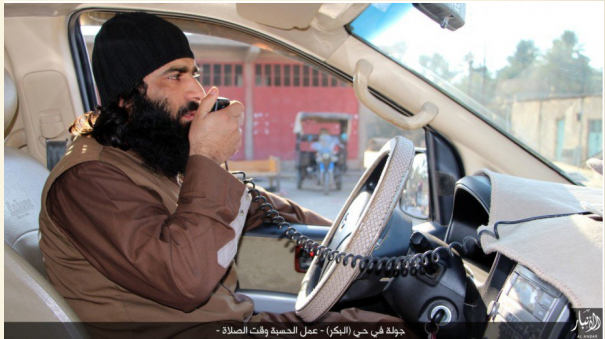Filing a Complaint in the Islamic State

Published by The Lawfare Institute
in Cooperation With

Editor’s Note: The Islamic State is a ferocious, brutal terrorist group. But at its peak it was also a large bureaucracy, complete with all the tribulations that come with that word. West Point’s Daniel Milton draws on a host of documents captured from the Islamic State that detail the many complaints made by group members and those living under its rule. He reveals a world of small problems and pettiness that are important reminders that even terrorist groups suffer from organizational problems.
Daniel Byman
***
Although the public understandably focuses on the death and mayhem that terrorists inflict on their victims, the groups themselves often act like petty bureaucracies. Wall Street Journal reporter Alan Cullison stumbled by chance on a looted computer that revealed much about the internal workings of al-Qaeda and found “the same sort of bickering and gossiping and griping about money that one finds in offices everywhere.” Since then, more and more information has come to light about the internal workings of terrorist organizations as documents they created to manage their organizations have come into the public sphere. A non-exhaustive list of topics covered by this material includes the dynamics of foreign fighter flows into Iraq, the ways in which the top echelon of terrorist groups tries to manage low-level fighters, and the media enterprise that the Islamic State created to manage propaganda.
While all of this material is fascinating, most of it focuses on the terrorist organization itself: its members, its structure, and so on. But many terrorist groups have larger ambitions beyond their own organizations. Almost exactly 10 years ago, the Islamic State of Iraq and the Levant declared itself a formal state, dropping the geographic references from its name and rebranding as the Islamic State. In doing so, it moved itself squarely from the realm of an organization producing violence to a government engaged in the business of statehood: teaching children, taking care of the poor, and creating a police force to patrol the streets, among other things.
However, the petty bureaucratic mindset persists even as terrorists make the leap from groups to would-be states. The latest batch of documents released by the Combating Terrorism Center (CTC) at West Point reveals this inner world and highlights a gap between what the group said about its quest to create a true and just Islamic society and what it did in practice. In a longer report published by the CTC, a co-author and I offered a preliminary analysis of the material, including a few key themes that emerge from the collection as a whole. The 396 documents are all complaints filed by members of the group and civilians living under Islamic State rule, covering a range of issues.
The mere fact that a complaint-processing infrastructure existed in the Islamic State is interesting in and of itself. It is likely, in part, a signal of the group’s efforts to relate well to those living under its control. Finding some favor with the population is no small matter in an area where government options were dismal: Syrians living under the Islamic State were previously under the rule of a dictator and in a state of civil war while Iraqis were plagued with corruption and insecurity. Public relations and popular opinion aside, the group’s implementation of this process is also the result of its efforts to establish governing practices according to its interpretation of religious imperatives. The documents suggest that, absent the combined impact of local and international military efforts, the Islamic State could have established itself more fully as the governing entity in Iraq and Syria.
The material provides a story-based deep dive into the challenges that people encountered as they lived within Islamic State territory. There has been no shortage of accounts in major newspapers and other venues about the terrible downsides of living within the caliphate: individuals accused of homosexuality being thrown off buildings, the limbs of thieves being amputated in a public forum, people accused of immorality being stoned, or, less brutally, people being fined for a wide array of behavior. But these internal documents take the shape of stories of individuals who ran afoul of both the group and other individuals, in many cases told in the first person by individuals seeking redress. In that sense, these documents are less an account of pushback against the group’s brutal legal interpretations than it is a collection of stories of people who suffered and dealt with the less structured outcomes of the group’s governance effort: abuse during raids, corruption by public officials, and family members who went missing after enlisting in the group’s fighting effort.
In any bureaucratic organization there will be inefficiencies, problems, and wasted time. Several anecdotes suggest that the Islamic State experienced several bureaucratic stereotypes. One document refers to a soldier who seems to be expert at always evading work. According to the complaint, “Whenever we assign something to brother Abul-Walid, he comes up with an excuse.” In a striking example of interoffice politics found in another document, an Islamic State police chief complains that he lacks a headquarters building because the real estate official in charge of providing the building will not return his calls. And, for all those familiar with sending paperwork off and never hearing back, a woman, twice widowed of her Islamic State soldier husband, complained that it had been three months since the issue was first raised and she still had not received any benefits.
The documents provide insight to much more than just complaints. A close examination of the collections show glimpses of society and the treatment and status of women within the caliphate. Dozens of the documents were authored by women and speak to the issues facing them specifically. In one complaint, a woman whose husband was imprisoned in Syria and whose son was killed fighting for the Islamic State asked for a home for her family to live in. Real estate officials did not help her and sent the police to remove her and her family from the home (which they had decided to live in without permission). Some physical abuse resulted, and when the woman complained to a judge, he put her in prison. Upon leaving prison, she petitioned the provincial governor for relief, which he seemed inclined to grant.
Another, perhaps more subtle societal issue in the caliphate was the tension between local and foreign fighters. Although such tensions have long been identified as a possibility in research, these documents suggest that it played out on the ground in Iraq and Syria. A grievance filed by a fighter from Indonesia asked for a transfer to a group of fighters who spoke the same language. Another document filed by a local fighter imprisoned following a dispute with the Islamic State’s religious police raised the possibility that two other individuals involved were released because they were from Tunisia and Libya. Testimony regarding a real estate dispute involved a comment that one fighter did not want to live next to any local fighter. To be clear, this batch of documents did not contain any direct complaints from locals about foreigners or vice versa, but some of the symptoms appeared to be there.
Finally, the first-person accounts in many of these documents provide an important reminder that life under Islamic State was difficult and unpleasant and its governance attempts far from perfect. A trio of men detained by the Hisbah (the religious police) for skipping Friday prayer protested that their unattended motorcycle might be stolen, but they were told, “Prayer is more important than a motorcycle.” Later, after their release, they could not find the motorcycle and received no sympathy from the Hisbah or the grievance office. A directive from the provincial governor said that he had received reports that officials at a certain checkpoint were treating civilians very poorly. A widow whose soldier son was killed by friendly fire could not receive the martyr’s benefit and was shuffled from one office to the next. Her case was further complicated when a witness to the manner of her son’s death died and her paperwork was lost by another office. In another incident, a fighter was detained and beaten and the impact of hearing his agony caused his pregnant wife to suffer a miscarriage. These stories are just a small sample of what the collection of documents contains. And they show that, in sum, life under the Islamic State’s control presented problems of every variety.
Though most of these recently released documents are from between 2014 and 2017, their relevance has not diminished. The Islamic State and its affiliated groups have continued to make advances around the world: doubling the amount of territory controlled in Mali, increasing the size of its fighting force in Syria and Iraq, inspiring and launching global attacks from Afghanistan, and focusing on religious outreach in Mozambique. The Islamic State will also likely continue to issue calls to foreigners to join its core group and satellite branches. These documents offer cautionary tales to those who might sympathize with or seek to join the group and demonstrate that, no matter how it is portrayed in propaganda, the group’s governance model will present challenges to those who live underneath it.





